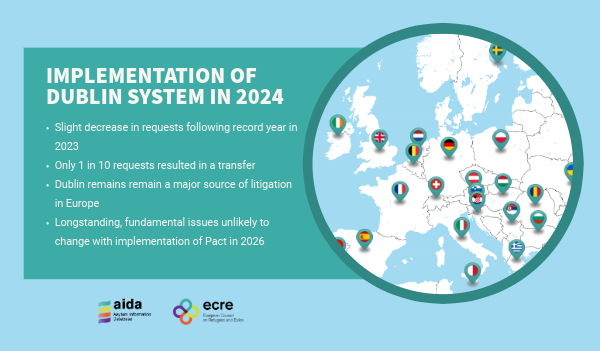|Published on: 20th November 2025|Categories: News|

The latest AIDA statistical update provides an update on developments in legislation, policy and practice relating to the implementation of the Dublin III Regulation in 2024, and an overview of case law on the suspension of Dublin transfers.
It includes the following key findings:
- Slight decrease in use of Dublin: After a record year in 2023 (201,868 outgoing requests), the 31 Dublin countries sent 170,661 outgoing requests and issued 164,532 decisions in 2024. Germany and France were again the main users of the system by far, jointly accounting for 64% of total outgoing requests.
- Continued low transfer numbers: Despite the high number of requests, the number and rate of actual transfers remained low: 18,860 outgoing transfers (10%). 19 countries had transfer rates equal to or below 30%, and five of them had transfer rates of below 3%. Crucially, the top three users (Germany, France and Belgium) all had transfer rates between 7% and 8%. Switzerland (fourth main user) was the exception with a 25% transfer rate. Countries that sent requests reported becoming responsible for asylum applications in 41, 128 cases of failed transfers (mainly to Italy and Croatia).
- Prevalance of “take-back requests”: The majority (69%) of Dublin requests concerned people who had already lodged an asylum application in another Dublin country.
- Very limited use of family provisions: Only 1.7% of outgoing requests were based on the criteria related to family unity and the best interests of the child. This was despite the fact that these provisions are at the top of the hierarchy of responsibility and should therefore have been prioritised. The vast majority (87%) of “take-charge requests” are based on the issuance of a visa or residence document (Article 12) or on the irregular entry criteria (Article 13(1)).
- Continued litigation on respect for fundamental rights: Dublin procedures remained a major source of asylum litigation in Europe before both domestic and European courts. However, jurisprudence continued to be inconsistent between and sometimes within countries regarding blocking transfers to certain partner countries for reasons related to respect for fundamental rights, including the existence of systemic deficiencies. The Court of Justice of the EU notably ruled on Italy’s unilateral suspension of incoming Dublin transfers and on the impact of pushbacks and detention at border control posts on the possibility of Dublin transfers.
- Dublin to become RAMM in 2026: The Dublin Regulation will be repealed and replaced by the Regulation on Asylum and Migration Management (RAMM) which was adopted in May 2024 as part of the EU Pact on Asylum and Migration. Analysis of the RAMM suggests that the changes will not be significant as the new rules on allocation of responsibility are very similar to the current Dublin system and, as such, the current shortcomings will remain. The RAMM will apply from July 2026 onwards.
The latest statistical update is available here and previous updates can be found on the AIDA website.
